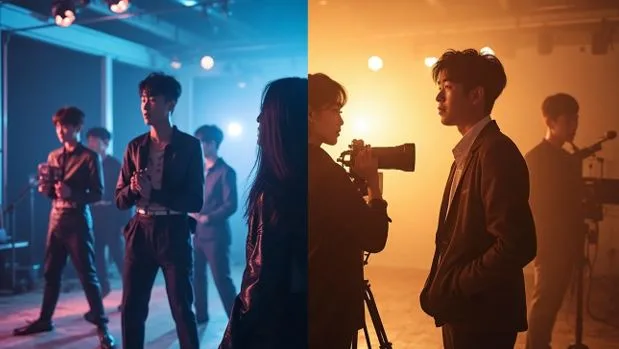K-Drama and K-Pop: How They Shape Modern Entertainment in 2025
The Korean entertainment industry has greatly influenced or changed the global media landscape. Squid Game season one stands as a prime example. The television series got over 1.65 billion viewing hours in the first twenty-eight days after release. It became Netflix’s most-watched series in 2021.
This soaring win marks just one highlight in the rise of Korean cultural exports. Interestingly, the emotional storytelling of K-dramas and K-pop’s worldwide appeal have altered the modern entertainment map globally. Here’s how these cultural exports are continuing to influence it.
The Global Rise Of K-Drama And K-Pop
Korean entertainment has altered the global media consumption map since the late 1990s. The Korean Wave, or Hallyu, started in Asia and has grown into a worldwide cultural force in the last decade. South Korean content dominates some streaming platforms. Evidently, K-dramas consistently rank among the top non-English language content on Netflix.
South Korea also produces 17% of the top 500 most popular non-US shows and films on the platform. Netflix sees this potential and has pledged $2.5 billion to South Korean content from 2024 to 2028.
K-pop’s growth numbers are even more impressive. In fact, Spotify streams of K-pop multiplied 470 times between 2014 and 2024.
Several factors accelerate this growth. South Korea’s government actively supports its entertainment industry in many ways. It does it through subsidies, tax benefits, and investments in facilities such as the Digital Media City. Streaming platforms have also transformed distribution methods, and effective localization through subtitles and dubbing has eliminated language barriers.
Emotional Storytelling And Viewer Connection
The worldwide appeal of Korean entertainment stems from its skilled and unique approach to emotional storytelling. It builds deep viewer connections. K-dramas use unique narrative techniques like affective interludes. They are moments that turn characters’ heartfelt feelings into bold spectacles, whether nostalgic, romantic, or despairing. These interludes pause the plot and draw viewer sympathy through carefully crafted visuals and music.
K-dramas achieve this emotional depth by design. They balance predictability with originality. Common story arcs, such as rags-to-riches or forbidden love, get distinctive Korean twists. This is because characters show deference to elders and filial piety. Production teams also invest heavily to ensure every detail adds to a positive, emotionally engaging viewing experience.
Amazingly, the emotional pull of Korean content brings many benefits. It helps viewers process complex feelings by showing characters who deal with personal growth, trauma, and grief. These interactions build a strong connection despite physical distance. Idols share mental health reminders and words of affirmation that strike a bond with their admirers.
Soft Power And Cultural Diplomacy Through Entertainment
South Korea has become skilled at soft power. It knows how to influence through attraction rather than coercion. So these cultural exports go beyond entertainment and represent a key national priority. South Korea is among the few nations that explicitly prioritize popular culture exports as part of its national strategy.
Outstandingly, many K-content viewers would want to visit Korea, which shows its diplomatic reach. Moreover, K-pop idols now serve as unofficial diplomats. For example, the Red Velvet entertained the North Korean leadership. BTS also met with President Biden at the White House in 2022 to discuss anti-Asian hate and inclusion. They also delivered speeches at the United Nations multiple times.
EXO also performed during the closing ceremony of the 2018 Winter Olympics in Pyeongchang. South Korea’s entertainment world has grown into a powerful force for cultural diplomacy. It influences diplomatic connections through smart strategy and steady investment. Each K-Drama and K-Pop hit continues to reshape global perceptions.
Shaping Modern Entertainment Trends In 2025
The South Korean entertainment industry stands at the crossroads of state-of-the-art ideas and worldwide influence today. Netflix shows its dedication to Korean content, which proves this dominance. The streaming giant released new Korean unscripted shows monthly through the first quarter of 2025. Their Korean content has more than doubled since 2022.
Advanced technology and Korean content meet to change the entertainment scene worldwide. Content Apex NYC 2025 runs from September 8th to 12th, bringing Korea’s most innovative entertainment technology companies to New York. Korea Creative Content Agency hosts this initiative to build direct connections between Korea’s digital entertainment ecosystem and American media giants.
AI has also become a game-changer in Korean entertainment. For instance, Leafie, a Hen into the Wild, a South Korean animated feature film, got a digital makeover using AI Super-Scaler technology, which cut production costs in half. Advanced AI was also used in the production of It’s Me, Moon-hee, a K-family drama film to create a digital version of famous actress Na Moon-hee. This mix of emotional storytelling, cultural authenticity, and improved technology creates a model that entertainment industries worldwide want to copy.
K-Drama and K-Pop Shape Modern Entertainment
The global rise of Korean entertainment shows how K-Drama and K-Pop have grown. They have evolved from local hits to worldwide cultural forces. South Korea has definitely achieved something extraordinary by creating content that strikes a chord across linguistic and geographical boundaries. This success comes from emotional storytelling techniques that Korean creators have become skilled at.





